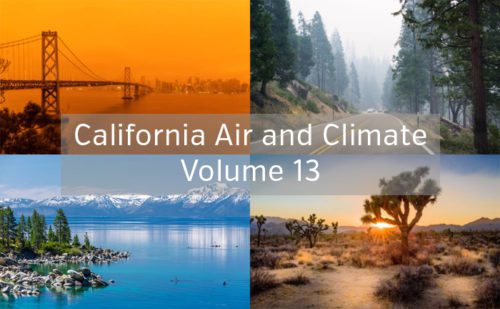California Air and Climate: CARB Adopting Commercial Harbor and Zero-Emission Truck Rules; Workshops for New CARB Emission Reporting Rules
February 2020
California Air and Climate, Vol. 13
CARB Developing Revisions to Commercial Harbor Craft Regulations
The California Air Resources Board (CARB) is in the process of developing revisions to regulations that are applicable to commercial harbor craft in California, including fishing vessels, ferries, excursion vessels, tug boats, tow boats, crew and supply boats, barges, dredges, as well as other freight sources including ocean-going vessels, cargo handling equipment, and drayage trucks. CARB adopted the original Commercial Harbor Craft (CHC) Regulation in 2007 to reduce toxic and criteria emissions from these sources. Under the current CHC Regulation, the majority of vessels with pre-Tier 1 or Tier 1 engine technology are required to be repowered with engines meeting higher Tier 2 or Tier 3 engine emissions standards. However, CARB staff has determined that once the CHC Regulation is fully implemented by 2023, craft and vessels subject to the rule will still contribute a significant amount of diesel particulate emissions. As a result, CARB is examining revisions to the CHC Regulation to further reduce emissions from commercial harbor craft and other freight sources including ocean-going vessels, cargo handling equipment, and drayage trucks. On March 5, 2020, CARB will host a public webinar to discuss potential revisions to the CHC Regulation. For additional information, please click here.
CARB Adopting Zero-Emission Truck Rules
CARB is holding public workshops to discuss its plans to implement zero-emission truck and fleet rules. CARB reports that medium and heavy-duty trucks and vans comprise about 6% of California vehicles, however these vehicles are responsible for about 21% of greenhouse gas emissions and 50% of NOx transportation emissions. The first proposal, named the Advanced Clean Truck Rule, will require certain percentages of truck manufacturers’ sales in California to be zero-emission vehicles. Sales percentage requirements would commence in 2024 and increase through 2030 with some classes of trucks requiring 50% of sales to be zero-emission. The Advance Clean Truck Rule also includes a one-time reporting requirement for entities in the state that own or hire large fleets of trucks. Required reporting includes fleet composition and type of use. The draft rule is scheduled to be adopted by CARB in May 2020. For more information, including the text of the draft rule, please click here.
The second proposal, the Advanced Clean Fleet Rule, would target entities that own, operate or hire fleets of medium and heavy-duty trucks, vans and buses in the state. CARB plans to adopt requirements forcing zero-emission truck and bus fleets everywhere feasible by 2045. It plans to use the fleet data that will be reported under the Advanced Clean Truck Rule to develop strategies to phase-in the zero-emission fleet requirements for classes of trucks and types of uses (e.g., last mile delivery, refuse trucks, utilities). CARB staff plans to develop the Advanced Clean Fleet Rule and recommend it for the Board’s adoption by 2021 or 2022 with implementation starting in 2024. For additional information, please click here.
CARB Holding Public Workshops on New Criteria Air Pollutants and Toxic Air Contaminants Reporting Rule
This month, CARB is hosting several public workshops throughout California to discuss proposed amendments to the newly established Regulation for the Reporting of Criteria Air Pollutants and Toxic Air Contaminants (CTR Rule), which became effective on January 1, 2020. The CTR Rule requires annual emissions data reporting from specified facilities, including owners or operators of facilities that are already subject to greenhouse gas emissions reporting. CARB is considering amendments to the CTR Rule to expand applicability requirements and to increase the number and types of facilities that will be subject to emissions data reporting under the Rule. For additional information about CARB’s scheduled workshops, materials and recordings from workshops that CARB already conducted, or for information about CARB’s proposed amendments to the CTR Rule, please click here.

